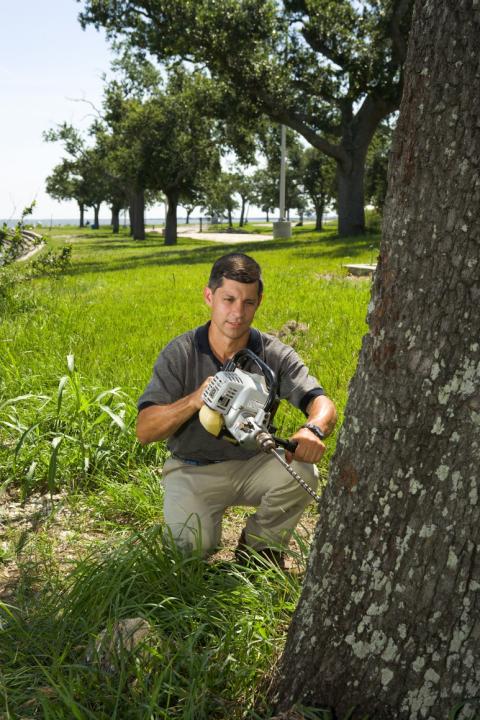What Should I Know About Commercial Applicator Licensing?

Photo by (Peggy Greb), USDA Agricultural Research Service
Commercial applicator (not for hire): what is the difference between a supervisory license and an operational license?
"There are two levels of commercial applicator licenses in New Hampshire: supervisory and operational. New Hampshire law requires that at least one member of any business, firm or entity is in possession of a supervisory level license. This must be the person who is actually supervising other persons who may be involved with the application of pesticides. Once a business or entity has obtained the supervisory license, they may wish to license other persons who would actually be applying the pesticides. The law requires that at least one member of each crew applying pesticides be in possession of, at least, an operational level license" (NH Department of Agriculture, Markets & Food, Division of Pesticide Control). For more information, refer to the following document from the Division of Pesticide Control: Commercial not-for-hire information.
Commercial applicator (for hire): what is the difference between a supervisory license and an operational license?
"There are two levels of commercial applicator licenses in New Hampshire: supervisory and operational. New Hampshire law requires that at least one member of any business, firm or entity or branch office is in possession of a supervisory level license. This must be the person who is actually supervising other persons who may be involved with the application of pesticides. In addition to the supervisory level license, the firm, branch office, or entity also has to be registered. When one obtains a supervisory license, that person would register the business at the same time. Once a business, firm or branch office has obtained the supervisory license and the firm registration, they may wish to license other persons who would actually be applying the pesticides. The law requires that at least one member of each crew applying pesticides be in possession of, at least, an operational level license" (NH Department of Agriculture, Markets & Food, Division of Pesticide Control). For more information, refer to the following document from the Division of Pesticide Control: Commercial for-hire information.
What are the commercial applicator categories?
As a commercial applicator, you need to have a category that corresponds to the site where you are using Restricted-Use pesticides. Each category is specific to one or more of the following:
- A1 - Fruit
- A2 - Herbicides
- A3 - Field Crops
- A4 - Animals
- B - Right-of-Way and Commercial Weed and Brush Control
- C1 - Forest Pest Control and Timber Treatment
- C2 - Christmas Trees
- D - Aquatic Pest Control
- E - Public Health Pest Control
- F1 - Industrial, Institutional, Structural, and Health Related Pest Control
- F2 - Mosquito and Black Fly
- F3 - Termites and Other Wood-Destroying Insects
- F4 - Fumigation
- F5 - Pole Treating and Wood Preservation
- F6 - Food Handlers
- F7 - Sewer Root Control
- F8 - Microbial Pest Control
- G1 - Shade and Ornamental Pest Control
- G2 - Turf
- G3 - Indoor Foliar Pest Control
- H - Demonstration and Research Pest Control
- I - Regulatory Pest Control
- J - Aerial Pest Control
